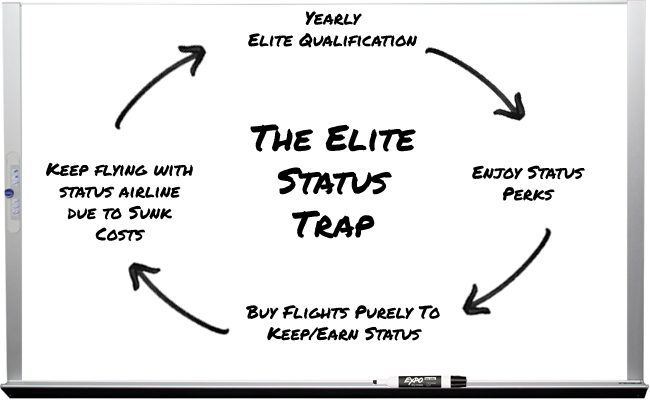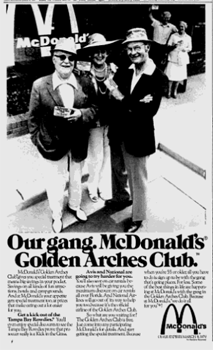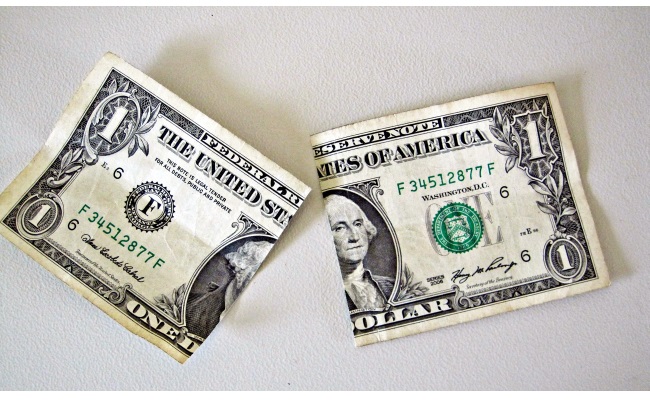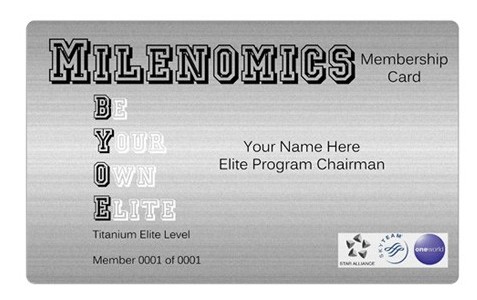Yesterday I mentioned that Elite Status can be a trap–and went over a couple of ideas you can use to Be Your Own Elites.
If I seem a little negative about Elite Programs, it is for good reason. From a marketing standpoint Elite programs work very well. We as humans want to feel wanted. And Elite programs do that very well. However make no mistake, you’re spending money for that feeling. You’re trading your Loyalty to your wallet for your loyalty to an Airline. Elite programs always work well for one party: Airlines. They may work well for you–but today we’ll cover some of the hidden pitfalls you’ll want to watch out for.
Sunk Costs and Irrational Thinking.
Sunk costs are a retrospective (past) cost that has already been incurred and cannot be recovered.
If you really have nothing to do you can read some very interesting PDF’s from Economists Hal Arkes and Catherine Blumer. This one, titled “The Psycology of Sunk Cost” is possibly the most referred to paper on the matter of sunk costs since it was published almost 30 years ago. Consider one example used in the paper:
- “A man wins a contest sponsored by a local radio station. He is given a free ticket to a football game. Since he does not want to go alone, he persuades a friend to buy a ticket and go with him. As they prepare to go to the game, a terrible blizzard begins. The contest winner peers out his window over the arctic scene and announces that he is not going, because the pain of enduring the snowstorm would be greater than the enjoyment he would derive from watching the game. However, his friend protests, “I don’t want to waste the twelve dollars I paid for the ticket! I want to go!” The friend who purchased the ticket is not behaving rationally according to traditional economic theory. Only incremental costs should influence decisions, not sunk costs.
A second example explained in the same paper is also important to review:
- Assume that you have spent $100 on a ticket for a weekend ski trip to Michigan. Several weeks later you buy a $50 ticket for a weekend ski trip to Wisconsin. You think you will enjoy the Wisconsin ski trip more than the Michigan ski trip. As you are putting your just-purchased Wisconsin ski trip ticket in your wallet, you notice that the Michigan ski trip and the Wisconsin ski trip are for the same weekend! It’s too late to sell either ticket, and you cannot return either one. You must use one ticket and not the other. Which ski trip will you go on? (54% of respondents chose the $100 ski ticket).
Since it was explicitly said that the Wisconsin trip would be more enjoyable 100% of people should have chosen the Wisconsin trip. The $100 in sunk cost shouldn’t factor in but it did for the 54% of people who said they’d go on the Michigan trip.
Real World Example LAS-PDX while tryring to re-qualify for US Status
Example: You know you’ll be flying LAS-PDX quite often for the next few weeks. It can only be flown nonstop with Southwest, Alaska, or Spirit Airlines. Alaska and Southwest both price the nonstop at $230-$240. The closest 1 stop pricing on US (where you are trying to re-qualify) is $274.
I’ll bet there are some of us who would say “well I’m close to re-qualifying and need all the miles i can get. With my 500 mile minimums I’ll earn 3,000 miles for the round trip.” Your sunk costs just won you over.
You paid $44 more for the flight and since it is no longer a nonstop, are spending 7 more hours of time at your T-Rate. Maybe got upgraded on the PDX-PHX segment. That meant you got a free drink, and some snacks. And yes, you’re 3,000 miles closer to Chairman’s preferred each time you do this. But you’ve spent money and a whole lot of time on that status. And therein lies the problem–you’re now even more invested in your status level. This is a vicious circle–whereby you spend more to keep your status, and because you’ve spent so much to do so you continue to do so.

The appropriate way to approach that situation would be “well I’m close to my next status level, and all my flights next year are going to be a little more comfortable if I reach Chairman. I know these LAS-PDX flights will be a waste of time and money.” If you still think it is worth it after thinking about it this way, then by all means go ahead. Focusing ahead means you’re not falling for the Sunk Costs, and are thinking about the situation clearly. Would you rather just pay for the upgraded status? Or just save the money and time and stop your status level wherever you end the year?
When it comes to Elite Programs, keep your eye on the future, not the past. For example, if you’re planning on having a child next year all the money in the world you spent to gain status might mean nothing if you spend the whole year on the ground.
The Theory of Adverse Selection
Adverse selection is: A situation where sellers have information that buyers don’t (or vice versa) about some aspect of product quality.
For an airline to survive it must do two things: Fly planes, and do so while not losing money. The problem is that while the first part is getting easier, the second may be getting harder and harder.
In the above LAS-PDX example I didn’t include Spirit Airlines because some of you may have varying views of them. On some dates I checked for a 3 day trip LAS-PDX Spirit was charging $118 round trip. This price is half that of anyone else flying it nonstop. Yes you would have to include bag fees, ticket fees, drink fees, and fees for wearing the wrong color tie, and any other fees. But as long as those fees added up to less than $120 or so you should seriously consider that flight–at least once to see if Spirit airlines is for you.
So much of what we do in travel is based on someone else’s experience. You swear off Southwest because You might have read about how bad Spirit is. But, have you read about how bad a flight from LAS-PDX is when connecting through PHX? Probably not, but you’re seriously considering it, to get 3,000 qualifying miles.
Ask an elite traveler which airline is the best–and more often than not they’ll tell you the one they’re an Elite in. This type of Adverse selection is furthered by the hype the airline attempts to deliver, not though service and impressive quality–but through marketing and advertising.
I’m asking you to try out those airlines you don’t know about–southwest, Virgin America, Frontier, or anyone else. Maybe they’re not as good as mainline carriers for you–or maybe they are. There’s only one way to be sure. At the very least, ask yourself this question: Am I buying this ticket for my own reasons, or for an internal bias that I hold (good or bad).
How Does This Relate to Elite Qualification?
I’m not saying to never become an Elite level member of a FF program. In some cases, qualifying is unavoidable. What we should be doing is focusing on flying the most for the least. Using our miles to book award tickets, and earning those miles from Milenomics Mileage Runs could make it impossible to qualify for status, and that’s a great thing. This year I’ll probably fly 80,000 miles, with 0 of that (or near 0) on paid tickets. I have no hope of reaching elite status, and I’ve spent so much less to get there.
I’d rather take the $350 I’d spend on a ticket and use that money towards Gift Card Fees– Money order fees- or anything else I need to generate miles. Then I’ll take those miles and book the ticket. Whatever’s left over is mine, not the airlines’ to keep.
With what we’ve learned about sunk costs we can rethink our Status qualification. “I’m so close to a higher status level” shouldn’t be on our thoughts. Including the thoughts about how much you’ve already spent means you’re falling into the Sunk Cost Fallacy. Only the value you will earn from that higher level should factor into your decision to make a push for that higher tier. Think only of your incremental costs to reach the status level, not what you’ve already spent to get there.
This effect of sunk cost happens with miles too. We see all our Miles as something we’ve invested time and effort into. This is why we can have too many miles, and also why we should use our miles. We should be looking for the best ways to use our miles, and get our balances as low as possible with our eye on total amount spent to earn those miles.
The Allure of Exclusivity
A few weeks ago McDonalds mentioned it was testing a club card. I had a chuckle when this news came out. The reason I laughed is that McDonalds tried this back in the late 1970’s and early 1980’s. The Card was only for senior citizens, and included discounts on car rentals with Avis, and a free coffee with any purchase.

Sure this club was for over 55 year old customers, but it offered a free small coffee with any purchase! Your mind connects the price of the coffee–maybe $1.75 now at McD’s and the word free, and you think “I’m getting a $1.75 for free every time I go to McDonalds.” What McDonalds sees is, “I’m giving this $.25 cup of coffee away, and getting repeat business.”
All loyalty programs are fairly similar: Give away something that costs little, but seems like it costs a lot. In exchange the company gets back continued purchases from your customer base without the need to be fully competitive. (adverse selection).
Tomorrow I’ll discuss this “give a little, get a lot” that works so well for marketing and profits of airline companies, and so poorly for us as consumers and Milenomcis.
Keep Your Eyes Open–the Elite Programs are Coming
Programs with tiers work. Giving someone a goal helps them to strive for that same goal. This is a strategy we can use as Milenomics, giving ourselves a goal to reach, and then using those miles.
For proof of the success of Elite tiers look at this past Christmas when Starbucks rolled out a $450 solid metal card:
- “The move by Starbucks blends two growing trends: consumer love of gift cards and upper-end exclusivity.”
As we see more and more “elite programs” spring up we should realize that first and foremost they’re effective marketing tools. Can our Loyalty be bought? I guess that is the basic question we’ll be looking at today. I know my answer to that question, what is yours?





One day cc bonuses and ms will be gone and this will all be poof.
Jeff: Very possible… but I think it would massively shake things up. Look at Level 3 POS Transactional data–moving towards CC companies knowing exactly what we buy–which could mean game over for the mainstream ways we MS. As far as CC bonuses going away… A must read:
http://www.ideaworkscompany.com/wp-content/uploads/2012/05/2011LoyaltybytheBillions-report.pdf
“Among these, banks loom as the primary buyers. The vast majority of the 114 billion miles sold by American during 2010 were purchased by Citibank, which is the primary issuer of credit cards linked to the carrier’s AAdvantage program. Very likely the bank paid more than $1 billion for the miles accrued by cardholders”
Plenty more in that PDF. Would be interested in your take on it.
Well or the points could devalue. Or go rev based.
The concepts you discuss on this site are somewhat contrarian, which I love. People who question conventional “wisdom” often come up with great insights.
The idea I’ve found most interesting is buying elite status. I’m very interested in buying
Gold status on DL. If you’re so inclined, I’d like to see your thoughts on how to make contact with top level DL elites I could pay to become gold.
The best way I can think is to post on the coupon connection sub-forum on Flyertalk. You can’t exactly say you’re going to pay cash for status–you’ll need to trade a mileage currency of some sorts. I posted in a prior BYOE article the going rate.
What you are describing is not adverse selection but rather a mere sorting based on consumer heterogeneity.
I totally agree with your views!! I’ve flown all year with rewards miles not paying more than the taxes on any given flight, sure my account is not in the 200 thousands but I’ve flown free everytime I wanna go somewhere, really just care about my own elite satus not any given airline!!